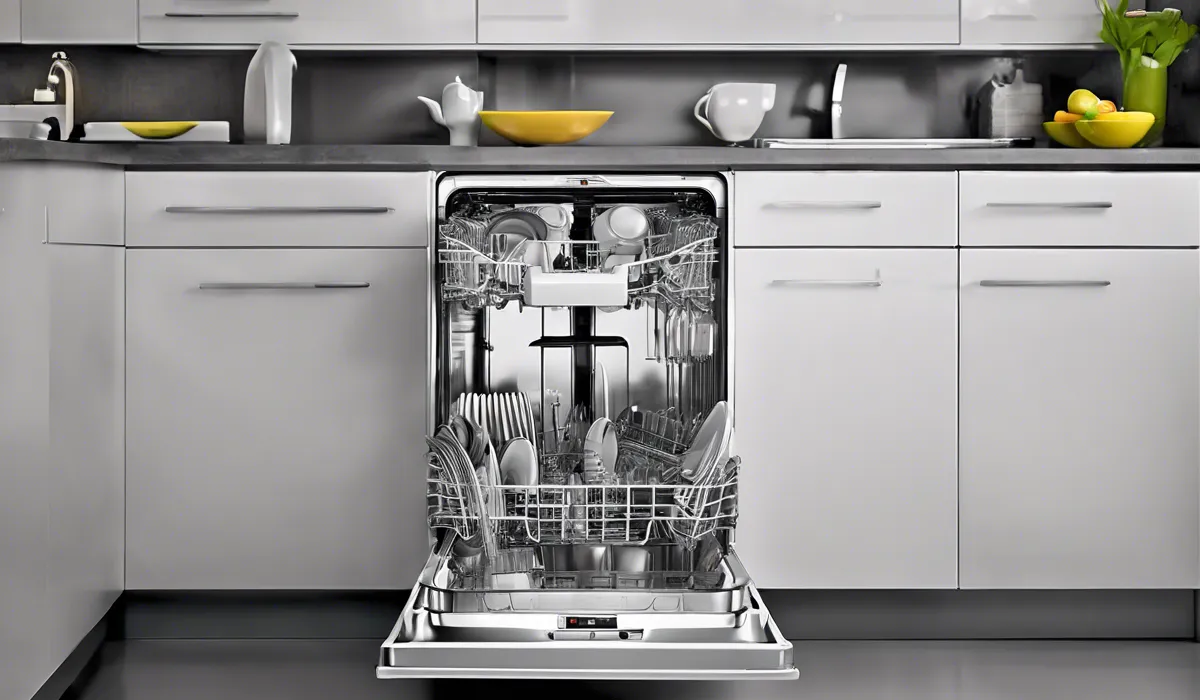Are Dishwashers More Efficient Than Hand Washing?
Yes, modern dishwashers are more efficient than hand washing, using less water and energy. They save time and can heat water more effectively, leading to cleaner dishes and reduced household utility bills.
Dishwasher vs. Hand Washing Efficiency

Comparison of Water Usage
Modern dishwashers are champions at conserving water compared to hand washing.
On average, an efficient dishwasher uses about 3 gallons of water per load, while hand washing can use up to 27 gallons for the same amount of dishes.
This stark difference in water usage underlines how dishwashers can help conserve this precious resource and reduce utility bills.
Comparison of Energy Consumption
When it comes to energy use, dishwashers again take the lead, especially models that are ENERGY STAR rated. These machines are designed to minimize energy consumption without sacrificing performance.
They heat water more efficiently and use less power during the washing and drying cycles, leading to lower electricity usage and energy bills.
Time Spent on Washing Dishes
Time is a non-renewable resource, and dishwashers save plenty of it. Loading a dishwasher might take a few minutes, but then it does all the work, freeing up time for other activities.
In contrast, hand washing requires constant attention and can be time-consuming, particularly for large households or after entertaining guests.
Quality and Consistency of Cleaning
Dishwashers provide a high quality and consistent clean, using robust jets of water and high temperatures that are tough on grease but gentle on dishes.
Hand washing effectiveness can vary, often depending on the individual’s effort and attention to detail. Dishwashers eliminate this variability, delivering a reliable clean every time.
The Impact of Pre-Rinsing on Efficiency
Many people believe they must pre-rinse dishes before loading them into the dishwasher, but this is a myth.
Modern dishwashers are equipped to handle food residue, and pre-rinsing can waste water. Skipping this step can save up to 20 gallons of water per load, boosting the dishwasher’s efficiency over hand washing even further.
Factors Affecting Dishwasher Efficiency

Types of Dishwashers and Their Efficiency Levels
Dishwashers come in a variety of types, including standard and energy-star rated models. ENERGY STAR rated dishwashers are particularly efficient, using less water and energy compared to their standard counterparts.
This certification is a guide for consumers looking to reduce their environmental impact and save money on utilities.
The Role of Detergent and Rinse Aids in Efficiency
The effectiveness of a dishwasher also hinges on the type of detergent and rinse aids used. High-quality detergents break down food particles more effectively, reducing the need for pre-rinsing and extra wash cycles.
Rinse aids help to prevent water spots and facilitate faster drying, which can lower energy consumption for the dry cycle.
Load Size and Its Impact on Efficiency
Running a dishwasher with a full load is most efficient. It maximizes the use of water and energy per dish.
Small loads waste water and energy, while overloading can lead to improperly cleaned dishes, possibly requiring a second wash, which doubles the resource use.
Dishwasher Settings and Cycles
Different settings and cycles can be optimized for different levels of soil. Light washes use less water and energy, suited for lightly soiled dishes, while heavier cycles are designed for pots and pans.
The eco-mode setting offers an optimal balance for everyday use, saving energy and water without compromising on cleanliness.
Maintenance and Its Role in Preserving Efficiency
Regular maintenance is crucial for keeping a dishwasher running efficiently. This includes cleaning the filters, ensuring spray arms are not obstructed, and occasionally using a dishwasher cleaner to remove any buildup.
Maintenance keeps the dishwasher performing at its best and extends its lifespan.
Environmental and Economic Implications of Dishwasher Use

Long-term Cost Savings with Efficient Dishwasher Use
Using an efficient dishwasher can lead to substantial cost savings over time. Reduced water and energy consumption means lower utility bills.
And since dishwashers can last for many years, the savings can really add up, making the initial investment in an energy-efficient model well worth it.
Environmental Impact of Reduced Water and Energy Consumption
Choosing a dishwasher over hand washing also has significant environmental benefits. Lower water and energy consumption means fewer natural resources are depleted, and there is less demand on water treatment facilities.
It aligns with sustainable living practices and helps to preserve the environment for future generations.
The Carbon Footprint of Manufacturing and Disposing of Dishwashers
While dishwashers are efficient in operation, manufacturing and disposal processes do contribute to their carbon footprint.
However, this impact is mitigated by their long lifespan and the efficiency gains over daily hand washing. Proper recycling at the end of life can also reduce this footprint.
Potential Rebates and Incentives for Using Energy-Efficient Appliances
Many governments and utility companies offer rebates and incentives for purchasing energy-efficient appliances like dishwashers.
These programs can lower the cost of buying an energy-star rated dishwasher, making it easier for households to invest in more sustainable appliances.
Comparison of Resource Depletion Between Hand Washing and Dishwashers
Resource depletion is a major concern when considering the impact of dishwashing methods.
Dishwashers require significant resources to manufacture, but their efficient use of water and energy over their operational lifetime often outweighs the initial resource use, especially when compared to the consistent, high levels of water and energy used in hand washing.
FAQs About Dishwasher Efficiency
Do dishwashers use less water than hand washing?
Yes, modern dishwashers use less water compared to hand washing, making them more water-efficient.
Are dishwashers more energy-efficient than hand washing?
Modern dishwashers are designed to be energy-efficient, using less energy to heat water and clean dishes than would typically be used when hand washing.
Can dishwashers save time compared to hand washing?
Yes, using a dishwasher saves time as it cleans dishes automatically, freeing up time for other activities.
Do dishwashers clean dishes more effectively than hand washing?
Dishwashers can heat water to higher temperatures than hand washing, leading to cleaner and more sanitized dishes.
Can using a dishwasher lead to reduced household utility bills?
Yes, the efficiency of modern dishwashers often results in lower water and energy consumption, which can reduce household utility bills.
Final Thoughts
Modern dishwashers surpass hand washing in efficiency by using less water and energy.
They not only save time but also enhance cleaning effectiveness through better water heating capabilities. This leads to spotless dishes and the added benefit of lower utility expenses for households.





